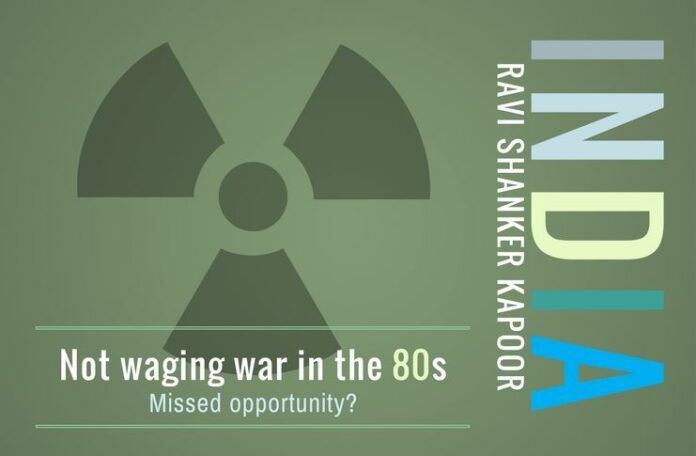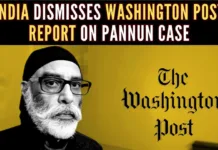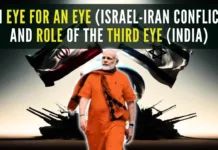
[dropcap color=”#008040″ boxed=”yes” boxed_radius=”8px” class=”” id=””]D[/dropcap]im-witted pacifists in particular and Left-libbers in general lecture us to shun war; they quote Mahatma Gandhi, the Buddha, Guru Nanak, and other personages to follow the path of peace; war, they say, always brings mass slaughter, devastation, and dehumanization; the cost of war, they warn us, is huge. In the context of India and Pakistan, however, it is peace that has proved to be exorbitantly expensive, far costlier than war.
…US warned Pakistan about an Indian military attack on the Pakistani nuclear reactor at Kahuta
I may sound like some deranged follower of Nietzsche glorifying war who got carried by passion and emotion. Nothing could be farther from the truth, for my approach is dispassionate and rational; and I will prove that India should have waged a war against Pakistan in the early 1980s, the time when its nefarious role in aiding and arming Sikh militants came to the fore.
A year ago, the US State department declassified its 1984-85 top-secret documents about the Pakistani nuclear programme. According to a write-up in The Indian Express (October 26, 2015), “the US State department declassified its top-secret documents from 1984-85 which focus on the Pakistani nuclear programme. The CIA analysis, and the talking points for the US Ambassador to Islamabad while handing over President Ronald Reagan’s letter to General Zia-ul Haq, show that the US warned Pakistan about an Indian military attack on the Pakistani nuclear reactor at Kahuta.”
This lent credence to a front-page story ‘India said to eye raid on Pakistan’s A-plants,’ that The Washington Post ran on December 20, 1982: “India’s military leaders have prepared a contingency plan for a preemptive strike against Pakistani nuclear facilities and proposed such an attack to Prime Minister Indira Gandhi earlier this year, according to US intelligence sources.”
[dropcap color=”#008040″ boxed=”yes” boxed_radius=”8px” class=”” id=””]T[/dropcap]ypically, her government didn’t back the plan. We should not forget that that was the high noon of Nehruvian Consensus; socialists, peaceniks, Muslim appeasers, and other disagreeable characters infested the policy and opinion-making apparatuses. So, unsurprisingly, “Gandhi decided against carrying out an attack when she first heard the proposal nine months ago but did not foreclose the option of striking if Pakistan appeared on the verge of acquiring a nuclear weapons capability, the sources said.”
Officially, India denied the existence of any such plan. K.R. Narayanan, India’s ambassador to Washington and later President of the Republic, actually called it “a figment of the imagination.” In New Delhi, Foreign Ministry spokesman Mani Shankar Aiyar, and later Union minister, echoed similar views. H.Y. Prasad, Gandhi’s spokesman, said, “There is no substance in this at all. There is no proof…” He, however, maintained that “Pakistan’s nuclear program or any part of its nuclear program would cause concern.”
…Pakistan has emerged as a terrorist state, run by mad mullahs and unconscionable generals who are capable of using the weapon of mass destruction to further the cause of Islamist supremacy. We should have reined in these psychopaths long back.
A book published in 2013 also referred to a military plan. The book, The End of the Cold War and the Third World: New Perspectives on Regional Conflict, by Sergey Radchenko and Artemy M. Kalinovsky, was based on the declassified documents of the Eastern Block.
There were also reports that India was seeking Israel’s assistance to wipe out Pakistan’s nuclear facilities. Israel had done the same to Iraq’s reactors. The sum and substance of various reports was that India did contemplate strikes at Kahuta but the political leadership backed out because of the fear of escalation into a full-fledged war.
[dropcap color=”#008040″ boxed=”yes” boxed_radius=”8px” class=”” id=””]T[/dropcap]he point is that even if India’s worst fear—that is, another Indo-Pak war—had come true, our human and economic losses would have been much less than those caused by the ensuing peace which, by the way, include the Kargil conflict. Consider this: as per the estimates of the Delhi-based Institute for Conflict Management, terrorism claimed 34,624 Indian lives during 1994-2016 alone. In comparison, total fatalities in all the wars Indians have fought since Independence do not cross the 20,000-mark.
So, had India destroyed the Kahuta facility in the early 1980s (and later, if required), and even if it had resulted in war, our casualties would have been a small fraction of casualties caused by the so-called peace. War would have been much less painful than peace has proved to be.
Further, had we made it our policy to never allow Pakistan reach the nuclear threshold, we would have not only served our national interests but also those of mankind. For Pakistan has emerged as a terrorist state, run by mad mullahs and unconscionable generals who are capable of using the weapon of mass destruction to further the cause of Islamist supremacy. We should have reined in these psychopaths long back.
But we must not underestimate the depravity and degeneracy of the Islamist mind; the frustrated guys who, dreaming of 72 virgins in the X-rated paradise, blow themselves up…
To some extent, our case is quite similar to the situation in Europe in the 1930s. After becoming chancellor, Hitler continued militarization and aggression, but European leaders appeased him. Hitler ended up remilitarizing Rhineland in 1936, thus violating the Versailles Treaty, and later gobbling up Austria and Sudetanland of Czechoslovakia. Winston Churchill kept screaming for action against Nazi Germany, but prime minister Neville Chamberlain turned a deaf ear to him. In fact, Churchill was called a war-monger.
[dropcap color=”#008040″ boxed=”yes” boxed_radius=”8px” class=”” id=””]T[/dropcap]o be fair to Chamberlain and other appeasers, we have to mention that they had reasons to avoid war with Germany. Over 7 lakh Britons, almost 2 per cent of the population, had died in the First World War. The horrors of the war were fresh in collective memory. Besides, the real victims of appeasement when it was carried out were weak nations of the Continent, not Great Britain. Against this backdrop, some concessions at the expense of other countries were understandable, if not justifiable.
In the case of India, however, peace with Pakistan in the 1980s and later was neither justifiable nor understandable. We are paying the price of cowardice and shortsightedness of the governments of the 1980s. Today, we have a rogue nation in our vicinity whose Defence Minister, and other leaders, threaten the use of atom bomb at the slightest pretext.
Most of it is bluff and bluster, and Prime Minister Narendra Modi has called their bluff. But we must not underestimate the depravity and degeneracy of the Islamist mind; the frustrated guys who, dreaming of 72 virgins in the X-rated paradise, blow themselves up, may also be tempted to massacre a few million infidels along with. This appears to be the reason that the Modi dispensation has refrained from celebrating the surgical strikes.
In a nutshell, the price of peace has been terrible for India—not just in terms of human and economic losses but also the birthing of a hideous threat, the nuclear arsenal. The chances of a nuclear war in south Asia are very slim, but they are there. If that happens, the culpability will solely lie with pacifists and Left-libbers who have messed with India’s policy for too long.
- Liberty Is Penalized, Violence Goes Untouched - December 21, 2019
- Rahul’s Howdy bloomer - September 22, 2019
- Chidambaram’s hypocrisy - August 22, 2019










